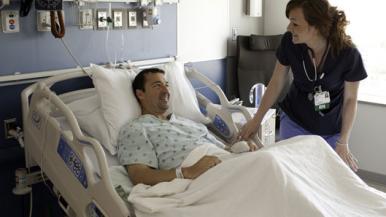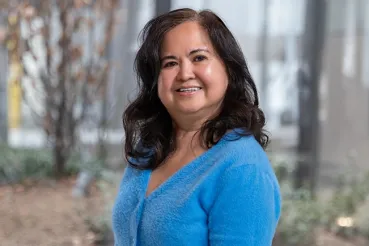By Kevin McKeough
Nurses are on the front lines of hospital care, implementing each patient’s treatment plan and tending to patients’ needs. Great nurses can make a great difference in the quality of care a patient receives, which in turn makes a great difference in the results of that care and patients’ degree of comfort.
The nurses at Rush have been recognized as being among the best anywhere — Rush University Medical Center and Rush Oak Park Hospital both recently received designations as Magnet hospitals, the highest honor in nursing. Though only 7 percent of hospitals in the United States currently have Magnet status, the Medical Center now has received the designation four times. Rush Oak Park Hospital, which just received its first Magnet designation, is one of only 54 hospitals of its size (between 200 and 300 beds) to earn the recognition.
“These are the best nurses giving the best care,” says Kelsey Schmitt, RN, shift coordinator in the pediatric unit at Rush University Medical Center. “I wouldn’t want to go anywhere else for my care.”
“For the patient, Magnet status means that they can come here and be assured that they are provided with the best care possible by the best nurses that can be hired by anyone,” says Denise Wienand, clinical nurse leader at Rush Oak Park Hospital.
In their own words, Rush nurses describe what it takes to be a Magnet nurse, and what it means for patients.
Bringing a higher level of skill to the bedside
Rush encourages nurses to obtain certification in various nursing specialties through review class and exam fee reimbursements, recognition and other incentives. (Certification is a nationally recognized credential awarded by a board or other certifying organization that and attests to a nurse’s knowledge and capability in a specialty area.).
“They give us plenty of opportunity to advance our practice, and we’re able to give that expertise, that knowledge base to our patients,” says Lisa Loggin-Hester, RN, pediatrics specialty manager at the Medical Center. “With all the technology we have at Rush, they make sure nurses have the knowledge of it.”
“It’s a continuum of learning, and you bring that knowledge back to the bedside. It’s evidence-based practice, learning we can do things a better way,” says Barbara Wizniuk, RN. A nurse in interventional services at the Medical Center, Wizniuk has earned a certification in medical surgical nursing.
Taking initiative on patients’ behalf
Rush nurses’ high level of skill and an institutional emphasis on collaboration results in nurses being entrusted to do what’s best for patients and nurses as partners with physicians in providing care. “They trust our judgment. We’re their eyes and ears,” says Tristan Banks, RN, clinical manager, outpatient colon and rectal surgery at the Medical Center.
“There’s autonomy on the job, and the doctors really listen to you and they respect you when you have a concern,” says Mark Shaulinskas, RN, who works in interventional services at the Medical Center. For example, doctors trust his and other nurses’ judgment when they’re administering conscious sedation during procedure such as organ biopsies and angiograms.
“The key things are enough to help keep the patient comfortable, but not too much, which could be dangerous. I may tell the doctor 'I am going to give 1 more mg, or 50 micrograms more' and physicians commonly trust my judgment,” Shaulinskas says.
Innovating to improve care
Rush nurses also are leading innovations to improve patient care. One of them is a Medical Center initiative to enhance patients’ recovery after surgery, which the American Nursing Credentialing Committee, which awards Magnet status, cited as an example of outstanding care. The initiative began in December of 2014 in inpatient colon and rectal surgery and has resulted in shorter patient recovery times, fewer complications and improved patient satisfaction.
“Every clinical area the patient encounters worked together to ensure the patient is able to recover safely after surgery. Patient education is key to the process, beginning in the clinic and continuing throughout the surgical process,” says Susan Hurley, RN, practice administration, general surgery at the Medical Center.
The Medical Center now is expanding the program to gynecologic oncology surgery and general surgery.
At Rush Oak Park Hospital, nurses have implemented a practice of transitioning care from one work shift to the next by having nurses on each shift discuss each case at the patient’s bedside. “You involve the patient and family in the handoff to make sure everything’s addressed, so everyone’s on the same page for shift to shift,” says Nicole Wynn, MSN, RN, telemetry nurse and education quality coordinator at the hospital.
Dedication that extends beyond hospital doors
Rush nurses’ dedication to their patients often extends past the hospital doors and end of a work shift. Barb Wizniuk once went to the home of a longtime patient one evening when the patient was having difficulty with his ostomy and tube feedings, and she stayed there all night until the patient was readmitted to Rush the next day.
“A lot of nurses here go beyond the hospital for their patients,” Wizniuk says. “They become like our family.”
Kelsey Schmitt has become attached to a pediatric transplant patient for whom she’s been providing care since he was an infant. She’s thrown him a birthday party in the hospital and takes him to a playroom to work off energy when he becomes restless.
“I always say I wish I could do more. I love my job, I love taking care of the nurses and taking care of my families,” Schmitt says. “If you talk to all of the nurses, that’s why they’re here, because they love what they do.”
“When you’re dedicated to your work, you care about the success of all the patients and that everybody succeeds with their health problems,” Nicole Wynn says. “You care enough that you would do everything to make that patient comfortable and treat them like your own family member.”
Nursing excellence is the goal, Magnet is ‘just a measure’
The combination of excellent clinical skill, empowerment and dedication that characterizes Rush nurses is the reason for Magnet designation, not the result of seeking it, observes Karen Mayer, PhDc, MHA, RN, vice president of patient care services at Rush Oak Park Hospital.
“Our first and foremost purpose and goal is to seek nursing excellence in the care of our patients and community,” Mayer says, noting that the hospital has achieved quality outcomes above national benchmarks. “Magnet certification is just a measure of our nursing excellence for those we serve.”
“Magnet status validates the high quality of care our patients receive at Rush. We are very proud of the outstanding work our nurses do and the difference they make for our patients,” says Melissa Browning, DNP, APRN, Magnet program director at Rush University Medical Center.
Browning notes that in addition to the Medical Center’s Magnet committee, the designation also was the work of Magnet champions and escorts, the professional nursing staff committee chairs and officers, and nursing leadership. “I am truly thankful to work with such an amazing group of people who not only care about their patients and families but also one another.”




